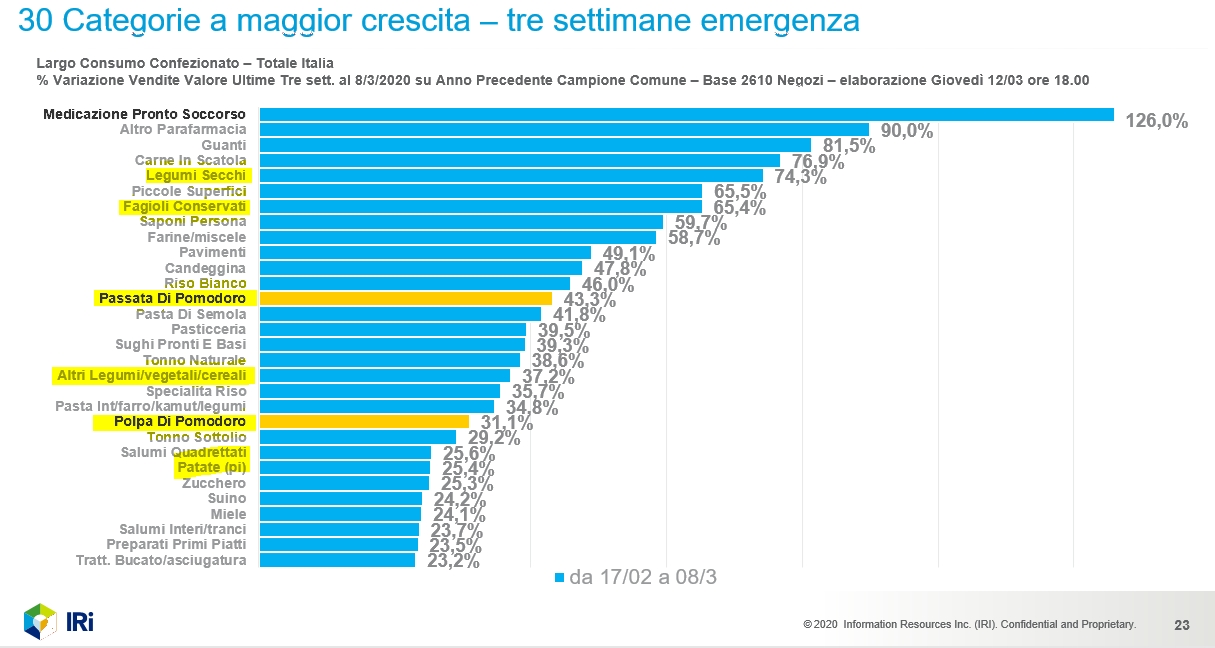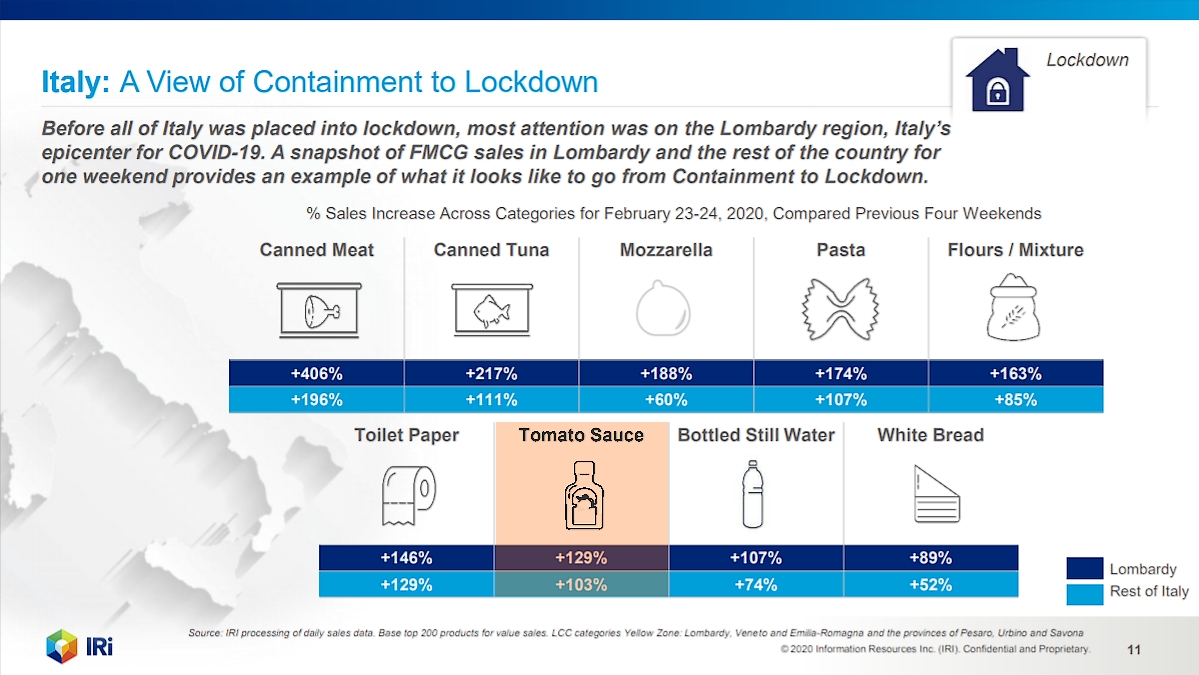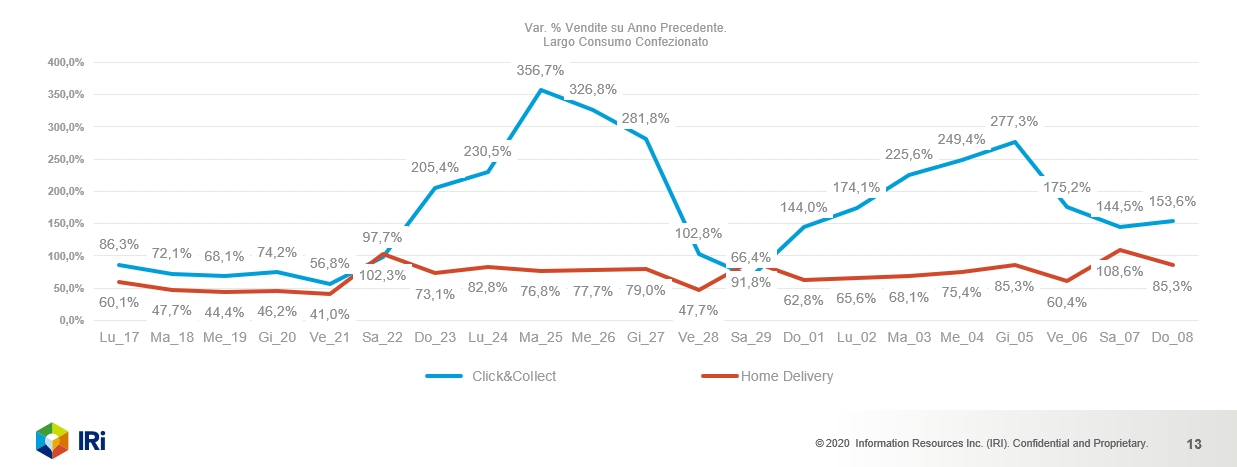Press release
, François-Xavier Branthôme
-
Covid-19: artificially inflated sales as store shelves are emptied
European governments and representatives of the food industry are seeking to reassure shoppers that the food supply is secure as the region becomes the “epicenter” for the COVID-19 outbreak.
Various European countries have now introduced social distancing and isolation measures in a bid to slow the spread of the virus – with schools, universities and restaurants being closed in multiple countries. Widespread fear that coronavirus will disrupt daily life in Europe has prompted many consumers to “panic buy” by stocking up on long-life staples like rice and pasta, as well as other staple products. But European governments, retailers and food makers are insistent that there is enough capacity in the system to cope.
In Spain, the industry has called for calm. Representatives insist that Spain benefits from a well-developed system of logistics platforms that serve a stores network of more than 24 300 outlets across the country (about one food store per 840 consumers). However, the message again is that panic buying – rather than COVID-19 itself – is the real threat to the security of supplies.
In Germany, food and agriculture minister Julia Klockner issued an appeal for consumers to restrain from panic-buying, urging “solidarity and moderation” and suggesting that “hamster purchases” and panic buying create an unnecessary additional strain on the system and will contribute to increased levels of food waste.
In France, the Minister of Economy and Finance as well as the Minister of Agriculture and Food insisted that “There is no shortage.” The supply of food and basic necessities “is guaranteed, […and] this will continue to be [the situation] in the days and weeks to come.” Nevertheless, while the Government's messages remain calm and measured, there is an acceptance that the food chain will face tougher tests still, with between 25-35% of employees expected to have to stay home to look after children while schools are closed.
In the UK, shoppers are urged to “be considerate” in the way they shop. “Retailers are working incredibly hard to keep shops well stocked and deliveries running as smoothly as possible. In the face of unprecedented demand as a result of coronavirus, food retailers have come together to ask their customers to support each other to make sure everyone can get access to the products they need,” stated Helen Dickinson, Chief Executive of the British Retail Consortium.
In Italy, “Food supply is ensured thanks to the work of 740 000 farms, 70 000 food processing companies and a widespread distribution network of shops, supermarkets, discount stores and farmers' markets,” said a Coldiretti statement. But it certainly is not business as usual for the Italian food industry, as businesses are grappling with concerns over security, economic difficulties, labor shortages and blockades at the borders.
The industry association noted that these challenges are compounded by a jump in household consumption, with 38% of Italians stockpiling food and drinks over the “unjustified fear” of shortages. Coldiretti also said Italian consumers were paying “particular attention” to product origin: a great majority of Italian consumers (82%) agreed it was important to buy Italian made food in response to the crisis.
Italy: major upsurge in sales of tomato products
According to an IRI survey of 10 644 stores, the expenditure on prepackaged consumption goods increased by 10.5% on average in Italy over the first week of March 2020, compared to the same week last year. This increase reached approximately 8% in the North of the country, with the South of Italy recording the sharpest increase, at 19.9%.
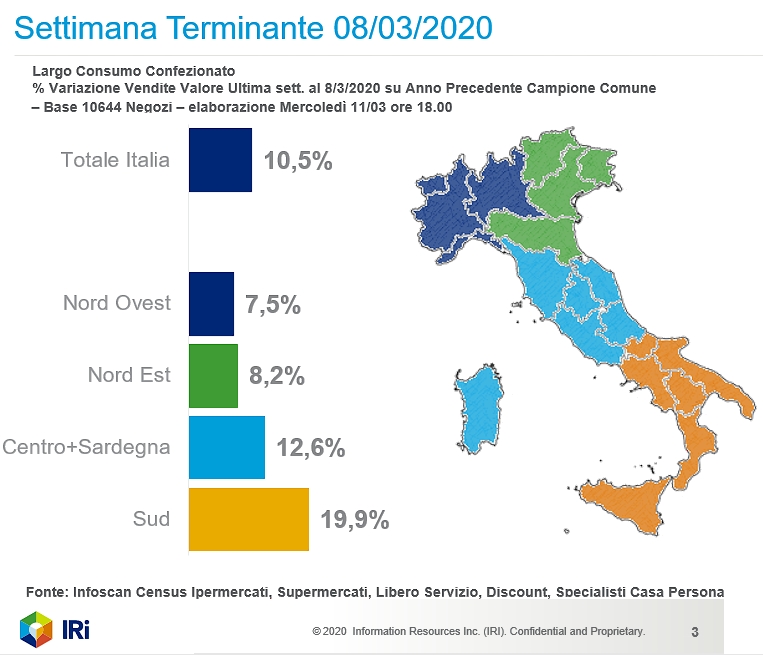
Among the categories that have recorded the sharpest increases in the fruit and vegetable sector (fresh and processed), the most notable are, in decreasing order: pulses (74.3%), canned beans (65.4%), tomato purée (43.3%), pulped tomato (31.1%) and potatoes (25.4%).
Before all of Italy was placed into lockdown, public authorities and institutional watchdogs focused particular attention on the Lombardy region, Italy’s epicenter for Covid-19. A comparison of the increase in FMCG sales in this region with the rest of the country for one weekend (23-24 February 2020) provides an example of what it looks like to go from “containment” to “lockdown”. In the case of tomato sauces, sales recorded a further acceleration, leaping from a 3% increase to some 29%.
Due to social distancing measures, online sales have also recorded spectacular progressions: over the three weeks of emergency sanitary conditions, online sales in Italy increased by 73.5% compared to 2019, confirming an already sharply upward trend. Use of Click & Collect buying options (Internet reservation followed by collection in a local retail outlet) increased by more than 150%.
United Kingdom: tomato product sales to be rationed
As a number of items are becoming scarce due to coronavirus, the Coventry Aldi retail store has rationed tomato puree as panic-buying spreads beyond essentials.
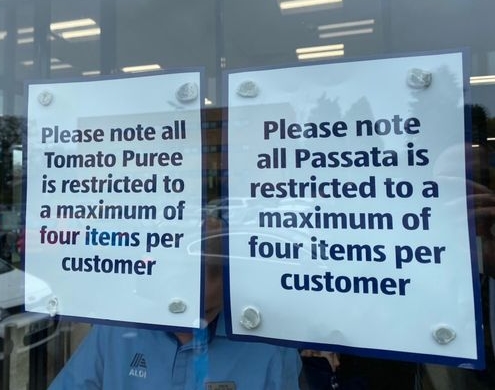
With the number of confirmed cases of the illness on the rise in the UK, shoppers have been descending on supermarkets, clearing shelves of essentials such as toilet roll and anti-bacterial soap. But the list of items that are becoming scarce is growing, with the Aldi store in Canley introducing sales restrictions on tomato puree and passata today (March 15).
This situation is not unique to the Aldi store in Canley. Local press sources mentioned similar scenes at other supermarkets, and in other cities. Supermarkets have started rationing items to cope with the influx of stockpiling customers – restricting the sale of items to a few units, saying: “All our stores remain open and continue to serve our valued customers. We have good product availability and our incredible colleagues are working tirelessly to restock and replenish shelves as quickly as they can.”
USA: labor shortage and empty shelves?
The situation in the UK and other European countries recalls what was described by the press a few days earlier in the United States. The companies that feed America and provide basic staples are bracing for labor shortages as the novel coronavirus pandemic intensifies, a situation that could leave them without enough workers to manufacture, deliver and unpack groceries in stores in the coming months.
Already, some chains are rationing products in scenes similar to those observed before a hurricane, yet this time unfolding on a national scale. In Washington, D.C., hundreds of people waited in lines that snaked to the back of stores and sometimes onto sidewalks at Walmart, Whole Foods and Trader Joe’s last week (8-14 March), as consumers stocked up on toilet paper, canned tuna and cartons of premade soups. At the Trader Joe’s in Tampa, the pasta and tomato sauce aisle was empty Friday (March 13) afternoon, and the salty snacks were depleted.

“The replenishment cycle is going to be the real test here,” said Sean Maharaj, a supply chain expert and managing director at AArete, a consulting firm in Chicago. Beyond that, industry officials acknowledge some uncertainty about how exactly they will be able to replenish their stocks if factories and ports worldwide are short-staffed.
There are already signs of far-reaching shortages: shelves of hand sanitizer and disinfecting sprays have remained empty for weeks across the country. Amazon is largely sold out of many items, with shipments that were due to be delivered earlier this week delayed indefinitely. Costco’s website, meanwhile, is out of peanut butter and canned tomatoes. But the big fear, explained Steve Meyer, an economist for Kerns and Associates who covers the pork industry, is that the coronavirus outbreak could impact workers. “If we had a major plant that had two or three workers test positive, they would have no choice but to suspend operations,” he said. “Same would be true for the beef business.”
It would be legitimate to add that “the same could be said for milk, bread and pastry, pizzas, fruit juices, tomato sauce...” In fact, it is obvious today that no business sector or industry can consider itself totally protected, beyond the reach of human drama and the threat to the ongoing operations of a company where a case of Covid-19 could potentially be diagnosed among workers of a meat slaughtering line, a transport company, a processing plant or a large retail store…
Even worse than the exposure to the risk of contamination, which concerns each and every one of us, the uncertainty caused by the rapid propagation of Covid-19 and the base attitudes and disproportionate reactions that it provokes could cause even greater prejudice to professional activities in general and to our industry in particular.
At a time when political authorities, both nationally and internationally, are calling for calm, circumstances require a positive attitude above all, whilst remaining confident in the future. It is time to remember the words of Pedro Calderon de La Barca, for whom “The worst is not always guaranteed!”
Some complementary data
For regular updates on the situation in Italy, consult the website:
https://www.iriworldwide.com/it-IT
Source: freshplaza.it, coventrytelegraph.net, Foodnavigator



